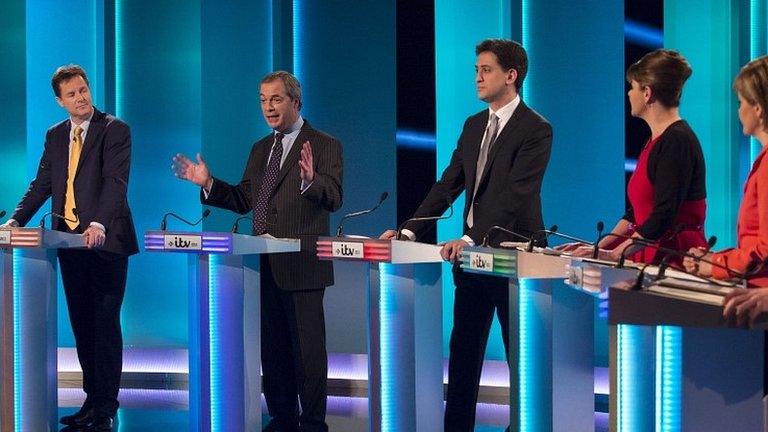Election 2015: Tories and Labour under pressure over coalition claims
- Published
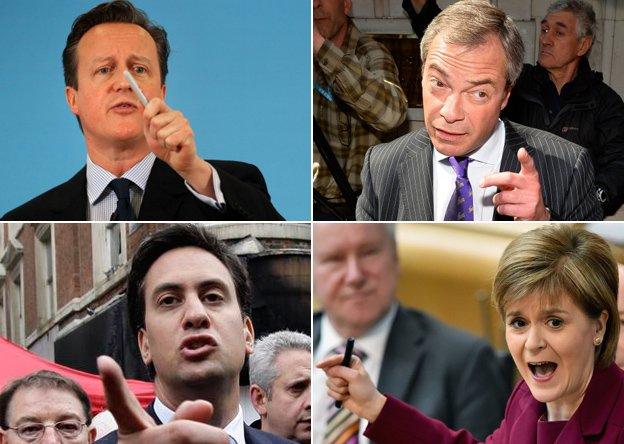
With the polls pointing to another hung parliament the party leaders have all to play for
The Conservatives and Labour have come under pressure over claims they could be forced into a post-election deal with UKIP or the SNP, respectively.
The polls suggest there may be a hung parliament after 7 May, raising the possibility of a coalition or a deal between different political parties.
Labour has called on the Tories to "come clean" over whether they would team up with UKIP, in that event.
And the Tories have warned a Labour-SNP deal would destabilise the country.
Former Lib Dem leader Lord Ashdown said Thursday's inconclusive seven-way leaders' debate suggested another coalition was inevitable.
The televised event featured David Cameron, Ed Miliband and Nick Clegg alongside UKIP leader Nigel Farage, the SNP's Nicola Sturgeon, Green leader Natalie Bennett and Plaid Cymru's Leanne Wood.
The opinion polls suggested there was no clear winner from the debate, but commentators said it made the British political system look very different from the traditional two or three-party set-up.
'Look down the lens'
With the polls pointing to there being no overall winner on 7 May, there has been pressure on the parties to say what they would do if they did not win a majority.
Nigel Farage has described David Cameron as "somebody we can sit down and talk to" but he said UKIP could "could never" do a deal with Ed Miliband because of his stance on the EU referendum.
Labour's shadow health secretary Andy Burnham said the public deserved to know whether the Conservatives planned to do a deal with Mr Farage's party.
He has written to David Cameron urging him to set out his intentions.
It comes after both Mr Cameron and his Conservative chancellor, George Osborne, refused to rule out a deal during separate media appearances.

Analysis by James Landale, BBC deputy political editor
For much of this campaign, the battle has been largely between the Conservatives and Labour. And they've been happy to keep it so.
Both parties want voters to see the contest as a binary choice, above all between two potential prime ministers, David Cameron and Ed Miliband.
But the seven-way debate has reminded voters of other possibilities.
The polls currently suggest that no one party is likely to win an outright majority. And so the smaller parties are keen to talk up the idea they may play a role in the next government.
So the SNP claims they could curb Labour cuts. UKIP hints they could speed up a Tory EU referendum. And the Lib Dems argue they could keep any government honest.
The question is whether these arguments will sway undecided voters.
Traditionally in election campaigns, support grows for larger parties as polling day gets closer and minds get focused. The smaller parties hope they can break that tradition and persuade people that this time, for once, they really could make a difference.

In a post-debate clash with Labour frontbencher Douglas Alexander on BBC 2's Newsnight, Mr Osborne was challenged to "look down the lens" and dismiss the prospect.
Mr Osborne said the Conservatives were aiming for a majority on 7 May - a response echoed by Mr Cameron in a Sky News interview the following morning.
Meanwhile, Tory chief whip Michael Gove was pressed on the issue during BBC Question Time, and said "nein danke" ("no thanks") to any deal with UKIP.
'Lethal cocktail'
"For 24 hours, a stream of Cabinet ministers have failed to rule out UKIP and the Tories doing a deal," wrote Mr Burnham in his letter to the PM.
He claimed a pact was supported by large numbers of Tory MPs and activists, and warned it would be a "poisonous proposition" which would harm the NHS,
"It is now essential that you come clean about your plans," he demanded.
Party leaders have been giving their experiences of the TV debate
Last month, Labour leader Ed Miliband ruled out the prospect of a formal coalition deal with the SNP if the party were to fall short of a majority on 7 May.
But the Conservatives say Labour has not rejected the idea of a more informal arrangement with the Scottish nationalists, such as support on a vote-by-vote basis - an idea Mr Cameron has described as "despicable".
Mr Gove told Sky News it was clear the SNP would pull Mr Miliband "well to the left" if he was forced to rely on their votes in the House of Commons.
'No brainer'
"I think that people appreciate that there would be an inherent instability in that arrangement," said.
He said people would not like the "potential chaos" of Mr Miliband as prime minister having to run every decision past the SNP who would only work in the interests of Scotland and Scottish nationalism.
"If the country chooses to it could vote for a patchwork coalition... I prefer to say a lethal cocktail of different parties which all have different objectives - there would be an automatic instability," Mr Gove added.
But Mr Burnham told the BBC Labour had been clear it would not want to see any deal "that furthered the prospects of the break up of the United Kingdom".
He accused the Conservatives of "talking up" an SNP-Labour pact to "distract attention" from the prospect of a Tory-UKIP arrangement.
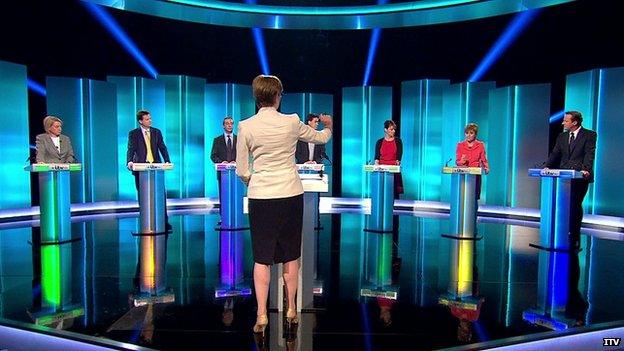
The historic debate saw the leaders of seven UK parties share the same stage
Liberal Democrat campaign chief Lord Ashdown said only the Lib Dems could provide stable coalition partners in a hung parliament.
"You have got three choices," the former party leader said.
"You have got the SNP working with Labour determined to break up the country, you have got the mad, right-wing, far fringes of extremism of Mr Farage, or you have got a Nick Clegg."
"If you accept the case there is going to be a coalition and no-one is going to govern by themselves, the choice between these three seems to me a no-brainer."
• Subscribe to the BBC Election 2015, external newsletter to get a round-up of the day's campaign news sent to your inbox every weekday afternoon.
- Published2 April 2015
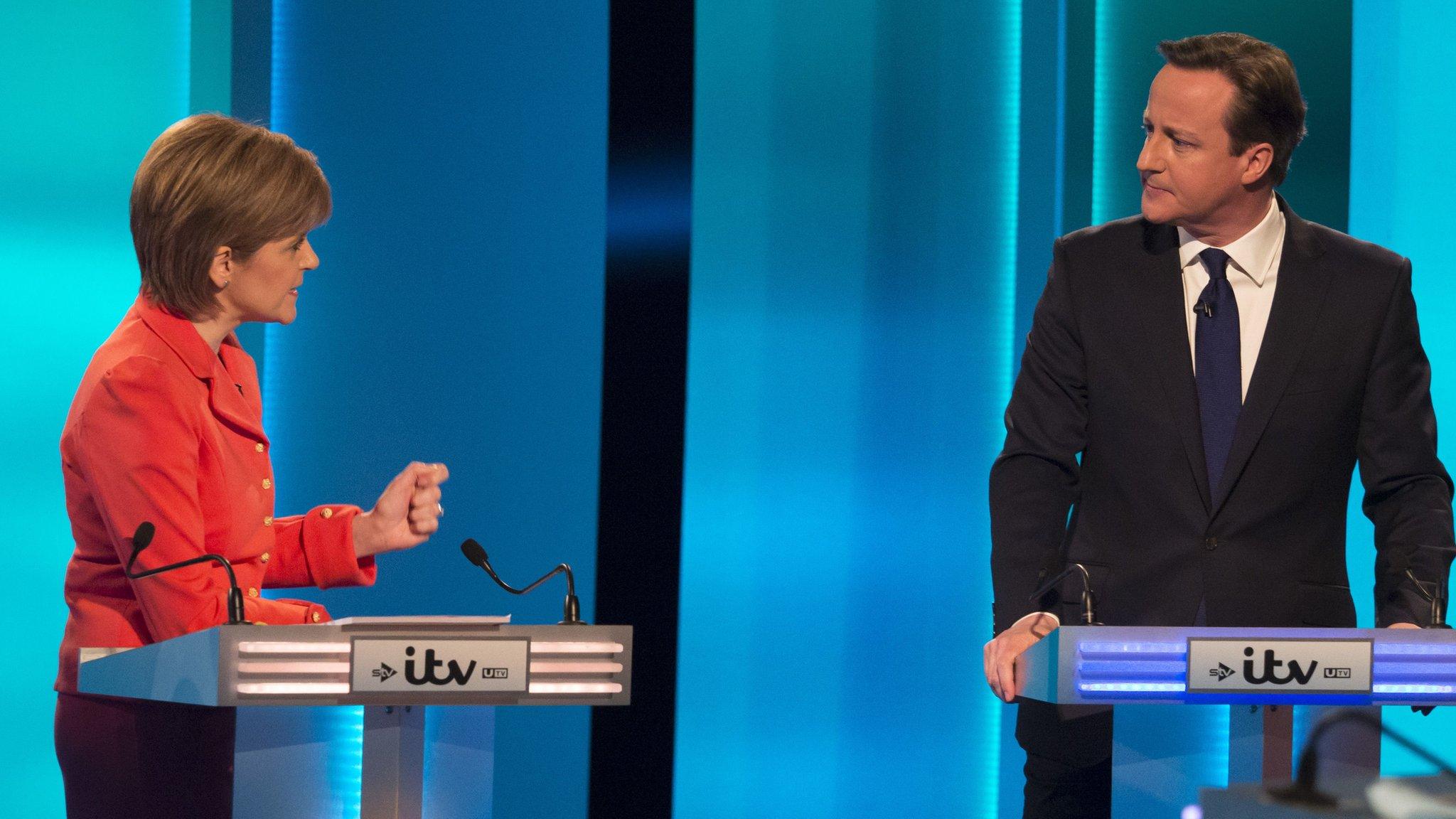
- Published3 April 2015

- Published16 March 2015
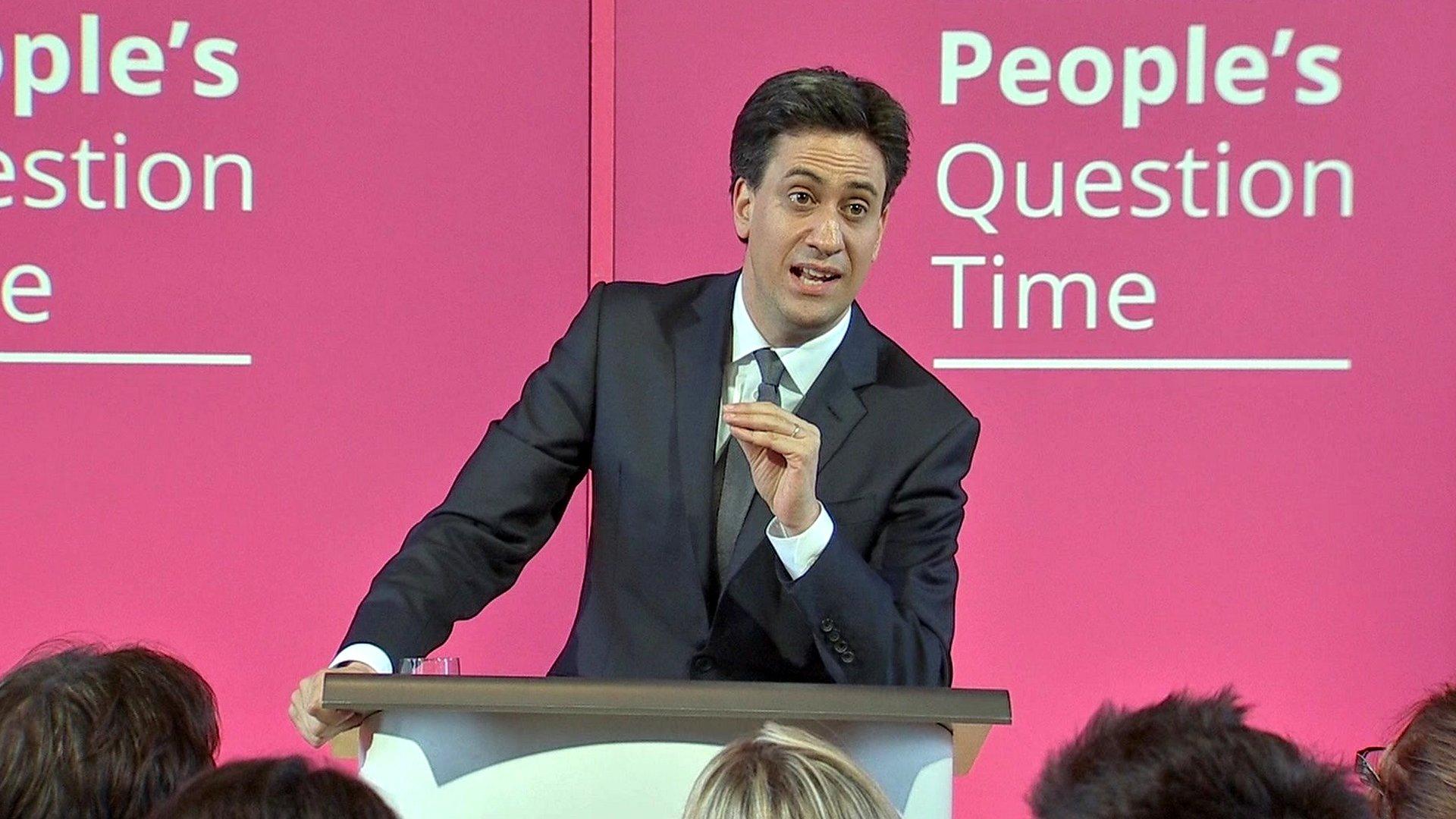
- Published2 April 2015
- Published3 April 2015
